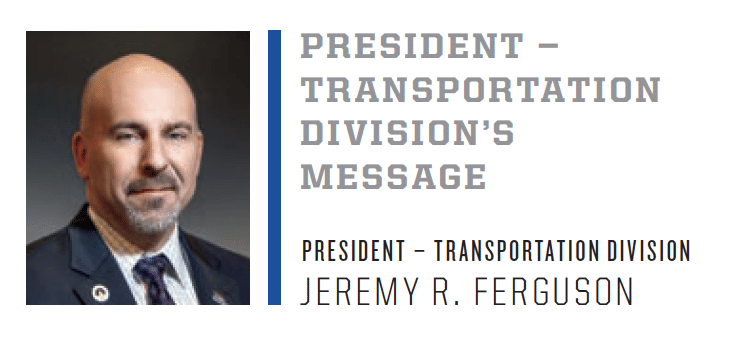Brothers and sisters,
We’re building something great here.

In May 2019, months before I took office, the Federal Railroad Administration (FRA) under Donald Trump appointee Ron Batory tried to toss out more than two decades of our members’ and officers’ work to preserve two-person freight crews.
Just days after my administration took office in October, the big rail carriers sued in an attempt to challenge our crew-consist agreements to further open the gates for railroads to get what they wanted — cutting workers in the cab so they could make more money at the expense of safety and common sense.
When both these challenges emerged, we rose up as one union, and we engaged.
The carriers’ lawsuit was resolved in court, and through on-property contract negotiations, our general chairpersons dug in on crew-consist matters. Since that attack in October 2019, we’ve not only preserved the current state of crew consist in the cab, but we have opened, for the first time, paid sick leave and attendance to negotiations so we can make the lives of our members better.
On April 2, United States Department of Transportation Secretary Pete Buttigieg and FRA Administrator Amit Bose announced a rule cementing freight train crew size in the country. As a result, carriers will need to carry a very heavy burden of proof in the future if they want the federal government to permit them to cross the line we have drawn on rail safety and crew size. Predictably, the railroads have gone to court to challenge the rule because they can’t leave well enough alone.
The final piece of our puzzle will be getting federal legislation passed to preserve the current safe level of staffing inside the cabs of the freight locomotives we operate. The Rail Safety Act of 2023 (RSA) has been long stationary in Congress. Together, we can get it moving. We will need to work for it, but we can do it. When the two-person crew rule was up for public comment, this union rallied together and created enough pressure in Washington, DC, that we could not be ignored. SMART-TD can and must do the same for the bipartisan RSA.
We also must work with equal focus to resolve the current state of danger that our bus and transit members have faced for far too long. Employers have made safety a low priority when solutions are staring the bosses right in the face. Things in Washington are moving in the right direction, but not fast enough.
The Federal Transit Administration (FTA) heard and heeded our comments in April when it ruled on the creation of on-property safety plans and on overall national safety plans for public transportation. Our practical solutions — protective barriers for operators, not making them deal with money matters, adding security on buses and transit, tougher punishments for attacks on the members we represent and all other bus and transit workers — can be done. There’s no rational reason for these public transit agencies not to join forces with us on protecting our members.
Most importantly, FTA’s rule states that our men and women will have seats at the table to make decisions on safety measures being taken at their respective workplaces. They will have a level playing field. Employers or managers will not be able to dominate on matters of safety, and if their bosses don’t follow through on the plans our members help form, FTA will step in and enforce them or take away their federal funding.
We in this union refuse to shy away from challenging injustice. It is an energy that we have worked to reignite and stoke the past five years. The results we’ve achieved on the two-person crew, elsewhere in the halls of power on the national and state levels, in negotiations and all around our union speak for themselves.
The same positive outcomes won’t be long in coming to enhance the safety of our bus and transit members. The FTA rule moves us forward. Together we can face all that is ahead for our organization with confidence.
In solidarity,

Jeremy R. Ferguson
President, Transportation Division
VIDEO
Related News
- After FRA rule, Jared Cassity explains why we still need the Rail Safety Act
- FTA action on bus, transit safety plans praised by SMART-TD
- Bus and transit workers deserve protection
- Minnesota governor signs omnibus bill, making two-person freight crews law
- In rail safety victory, 2PC signed into law in Ohio
- John Risch: FRA, Trump administration halt all crew safety efforts